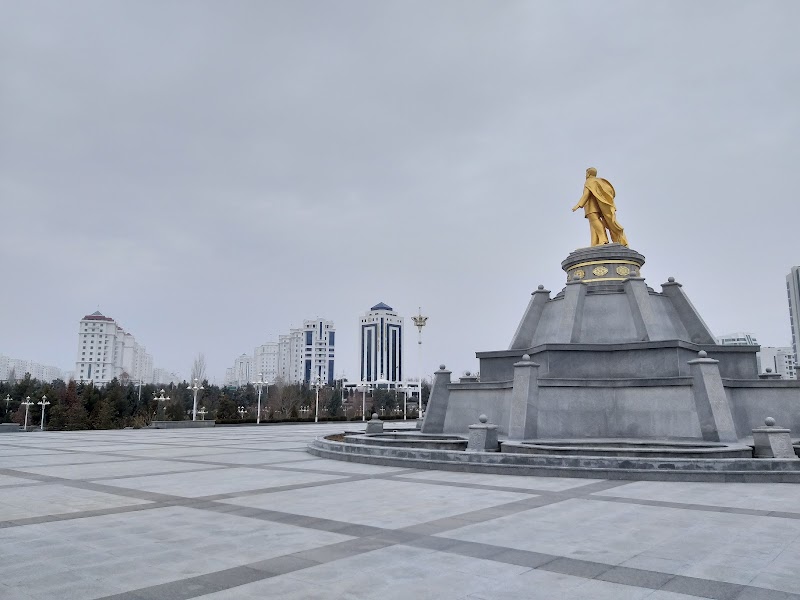Saparmurat Atayevich Niyazov, also known as Turkmenbashi, served as the first President of Turkmenistan from 1991 to 2006. He was born on February 12, 1940, in Gypjak, Turkmen SSR, Soviet Union, to an ethnic Turkmen family. Niyazov’s father died during World War II, and his mother raised him and his siblings.
Niyazov began his career in the Soviet Communist Party and held various positions before becoming the First Secretary of the Turkmen Communist Party in 1985. In 1990, he was elected Chairman of the Supreme Soviet of Turkmenistan, the republic’s highest legislative body. Following Turkmenistan’s independence in 1991, Niyazov became the country’s first President.
Niyazov’s rule was characterized by authoritarianism and a personality cult. He assumed the title “Turkmenbashi,” meaning “Leader of the Turkmen,” and exercised absolute power. Niyazov implemented a number of controversial policies, including a ban on opera and ballet, the renaming of months and days of the week after himself and his family, and the promotion of his own book, the Ruhnama, as a compulsory textbook in schools and universities.
- Ethnic Background: Turkmen
Niyazov’s achievements include presiding over a period of economic growth and stability in Turkmenistan, thanks to the country’s extensive natural gas reserves. He also implemented social programs aimed at improving education, healthcare, and social welfare. However, his legacy is tarnished by his authoritarian rule, suppression of dissent, and human rights abuses.
- Achievements:
- Economic Growth and Stability
- Social Programs
- Ruhnama Book Promotion
Niyazov’s popularity among the Turkmen people was complex. He was seen as a strong leader who brought stability to the country after the collapse of the Soviet Union. However, he was also criticized for his authoritarian rule and the cult of personality surrounding him. Niyazov died of a heart attack on December 21, 2006, at the age of 66. He was succeeded by Gurbanguly Berdimuhamedow.
- Legacy:
- Authoritarianism
- Personality Cult
- Economic Growth
- Human Rights Abuses
Emblem of Turkmenistan
To enrich your insights into presidential figures worldwide, also explore some prominent first presidents from other countries, such as Turkey, Tunisia and Trinidad and Tobago. Delving into the leadership journeys of these figures can offer valuable perspectives on their historical significance and pivotal roles in shaping global politics.
The official residence and symbol of the Turkmenistan President
10 Iconic Presidents Who Shaped Turkmenistan’s History

Turkmenistan is a country in Central Asia with a rich political history. Over the years, it has had several influential and popular presidents who have left a mark on the country’s governance. Here are 10 of the most popular presidents from Turkmenistan:
- Saparmurat Niyazov
- Gurbanguly Berdimuhamedov
- Kurbanguly Berdymukhamedov
- Ovezgeldy Ataýewiç Ataýew
- Serdar Saparmurat Turkmenbaşy
- Batyroň Kerimbekowiç Aýtmammedow
- Gurbannazar Eyvazov
- Pıöräli Pıerudemirgiç Ukarow
- İçan Seýitniýazow
- Sapar Gurbanmuhammedov
1. Saparmurat Niyazov: He served as the first president of Turkmenistan after it gained independence in 1991. Niyazov is known for his authoritarian rule and the cult of personality he cultivated around himself.
2. Gurbanguly Berdimuhamedov: He has been the president of Turkmenistan since 2006. Berdimuhamedov has focused on expanding the country’s economy and improving its international relations.
3. Kurbanguly Berdymukhamedov: He is the son of Saparmurat Niyazov and served as the president of Turkmenistan from 2006 to 2021. Berdymukhamedov continued his father’s policies in many areas, including the country’s political and economic systems.
4. Ovezgeldy Ataýewiç Ataýew: He served as the chairman of the Supreme Soviet of the Turkmen SSR and later as the president of Turkmenistan from 1993 to 2000. Ataýew played a significant role in the country’s transition after the collapse of the Soviet Union.
5. Serdar Saparmurat Turkmenbaşy: He was the son of Saparmurat Niyazov and served as the chairman of the Halk Maslahaty (People’s Council) of Turkmenistan. Turkmenbaşy played a crucial role in promoting Turkmen traditions and culture.
6. Batyroň Kerimbekowiç Aýtmammedow: He served as the chairman of the Supreme Soviet of the Turkmen SSR and later as the president of Turkmenistan from 2000 to 2001. Aýtmammedow focused on economic reforms during his presidency.
7. Gurbannazar Eyvazov: He served as the chairman of the Supreme Soviet of the Turkmen SSR and later as the president of Turkmenistan from 2001 to 2003. Eyvazov implemented social and economic reforms during his tenure.
8. Pıöräli Pıerudemirgiç Ukarow: He served as the chairman of the Supreme Soviet of the Turkmen SSR and later as the president of Turkmenistan from 2003 to 2006. Ukarow introduced significant changes to the country’s political and economic systems.
9. İçan Seýitniýazow: He served as the chairman of the Supreme Soviet of the Turkmen SSR and later as the president of Turkmenistan from 1985 to 1991. Seýitniýazow played a crucial role in the country’s transition to independence.
10. Sapar Gurbanmuhammedov: He has served as the chairman of the Mejlis of Turkmenistan and is currently a prominent figure in the country’s political landscape. Gurbanmuhammedov has been influential in shaping Turkmenistan’s policies.

